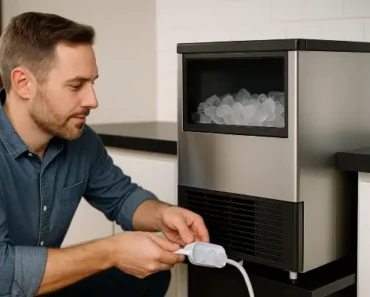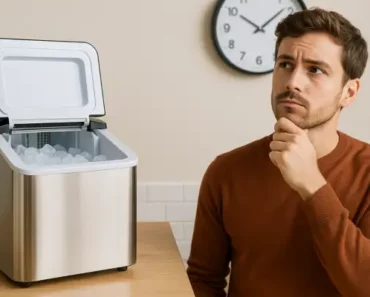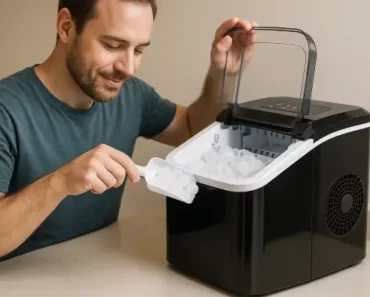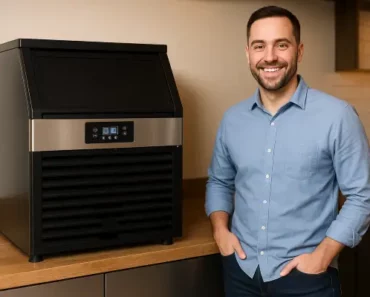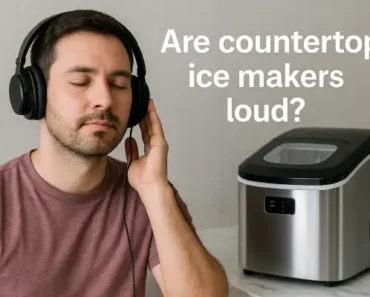Many homeowners and business owners wonder “Can ice makers be used outdoors?”, though each group has unique reasons. Homeowners usually look for a countertop ice maker for backyard gatherings, pool parties, and outdoor kitchen setups where convenience and mobility matter most. The appeal of fresh ice without trips back to the kitchen makes outdoor placement tempting during summer.
Restaurant owners and commercial establishments, meanwhile, explore outdoor ice maker options for outdoor bars, and frequent events. Undercounter ice makers in these settings must maintain consistent production despite varying conditions while meeting higher volume demands. Environmental factors affect both countertop and undercounter ice makers the same, with considerations around temperature ranges, electrical requirements, and installations.
I’ve made a comprehensive “Ice Maker FAQ” series collecting all common ice maker problems to help Ice Artisan readers quickly troubleshoot their ice maker units.
- ⚖️ Countertop vs undercounter ice makers
- 👍 Are portable ice makers worth it?
- ⚡ How much electricity does an ice maker use?
- 💧 Does an ice maker use a lot of water?
- 🪣 Do ice makers need to be drained?
- 🚫 Can ice makers cause water damage?
- 🚰 Do ice makers need water lines?
- 🔊 Are countertop ice makers loud?
- 😭 Do ice makers make a lot of noise?
- 🔗 Are countertop ice makers safe?
- ⛺ Can ice makers be used outdoors?
- 🔌 Can ice makers be left running all the time?
- 🚗 Can ice makers be used in RV?
- 🗄️ Can ice makers be installed in cabinets?
- ❄️ Do portable ice makers keep ice frozen?
- 🛠️ Can ice makers be used in garages?
- 📄 Do ice makers store ice?
- 🚀 How do ice makers make ice so fast?
- 💡 How does ice maker work?
- 🎰 How does a commercial ice maker work?
- 🛠️ How to install an undercounter ice maker?
- ❄️ How to make clear ice in ice maker?
- 🪣 How to increase ice production in ice maker?
- ⏳ How long does an ice maker take to make ice?
- 🔗 When to replace ice maker filter?
- ⏱️ When to replace ice maker?
- 💡 How to clean ice maker?
- 😭 Why does my ice maker smell bad?
- 🫗 How to drain an ice maker?
- 🪣 How to unclog an ice maker?
- 🔗 How do I unstick my ice maker arm?
- 💧 How to fix ice maker leaking water?
- ❄️ Why is my portable ice maker making too much ice?
- 🥵 Why is my ice maker hot?
- 🔌 What happens if you don’t turn off the ice maker?
- 🧊 How to fix ice maker not making ice?
Ice Artisan‘s best picks
Can ice makers be used outdoors?
Yes, ice makers can be used outdoors, and many commercial ice makers are designed specifically to withstand the outdoor environments. Even portable ice makers can run outdoor, however, you need careful consideration of several important factors.
The Euhomy CFIM-30D is a special ice maker that’s made for outdoor uses, which is also the best ice maker for RV, in Ice Artisan.
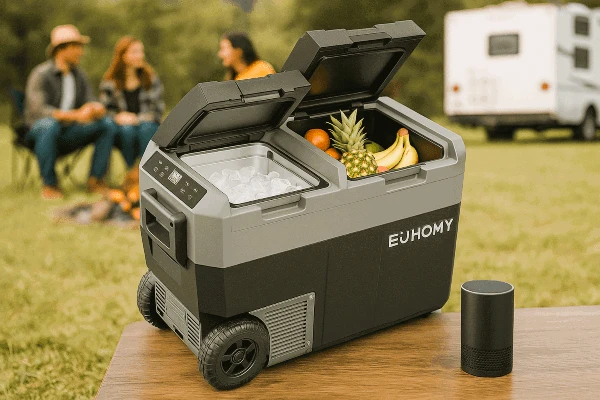
Outdoor temperature matters
Standard countertop ice makers typically operate within a specific temperature range of 50-90°F (10-32°C). Commercial undercounter models generally require ambient temperatures between 45-90°F (7-32°C) for optimal functionality. So far, both types of ice makers can’t work really well under the extreme heat of summers. If you’re looking to make your unit run under extreme conditions like this, think of using roof and other cooling fan for the ice maker to work properly.
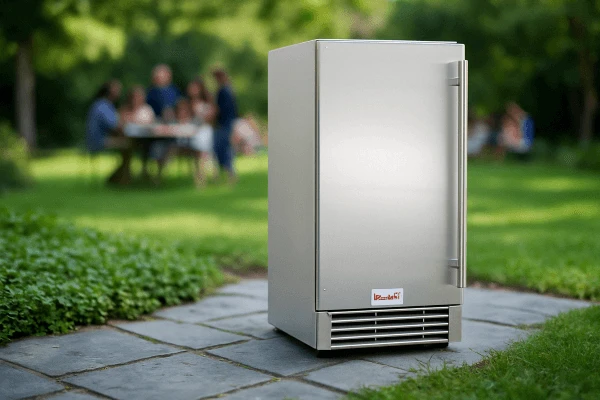
Business owners can rest if they decide to buy an outdoor undercounter ice maker, because such a high-end ice maker is built with materials that can withstand easily the heat of summers.
Different environmental factors
Most standard ice makers lack the necessary protection against environmental elements. Exposure to moisture, dust, and UV radiation quickly damages internal components, potentially shortening lifespan by up to 75%. Manufacturers normally void warranties for standard units installed in outdoor settings.
Properly designed outdoor ice makers feature:
- Weather-resistant 304 or 316 grade stainless steel exteriors
- UL-approved weatherproof electrical components
- Enhanced insulation against temperature fluctuations
- Sealed components protecting against moisture and dust
- Operating temperature ranges typically between 40-110°F (4-43°C)
Should you use an ice maker outdoors?
Homeowners should note that all portable countertop ice makers require protection from direct sunlight, rain, and extreme temperatures. Semi-protected areas with overhead covering offer some advantages but cannot magically make one outdoor-rated equipment.
Restaurant owners should dedicatedly look for an outdoor commercial ice maker, which is designed to produce ices under the most extreme conditions. Most “outdoor-approved” ice makers come with appropriate UL certifications.
The bottom line? Yes, you can use an ice maker outdoors, but make sure you have some temporary protection for your ice maker to work under summer’s light. For reliable, long-term outdoor ice production, investing in a properly designed outdoor-rated model is recommended for both residential and commercial applications.

